Fellowship
- Department of Medicine
- About Department of Medicine
-
Specialties
- Cardiology
- Clinical Immunology
- Digestive Diseases
- Endocrinology
- General Internal Medicine
- Geriatrics
- Hematology and Oncology
- Hospital Medicine
- Infectious Diseases
- Nephrology
- Palliative and Supportive Care
- Pulmonary, Critical Care and Sleep Medicine
- Genetics and Genomics
-
Education Programs
- Student Programs
-
Internal Medicine Residency Program
- Internal Medicine Residency Program Home
- About the Program
- Residents
- Applicants
- Social Media
- Medicine/Pediatrics Residency Program
- Fellowship Programs
- Board Review Course
- Research
Fellowship Program Curriculum
Outpatient experience
Fellows participate in one half-day pulmonary continuity clinic weekly. Outpatient clinics are continuity clinics with every effort to ensure that fellows follow their patients during their time in that clinic. In the third year, fellows participate in a variety of subspecialty clinics, including but not limited to Pulmonary Hypertension, Cystic Fibrosis, Interstitial Lung Disease, and Lung Nodule clinic. Faculty, providing guidance and supervision, participate with fellows in each clinic.
Ambulatory clinic facilities take place in the multidisciplinary University Clinics at the Pavilion and VAMC. Both settings offer full outpatient services, including nursing, pharmacy, multidisciplinary consultative services, respiratory therapy, phlebotomy, clinical laboratory, diagnostic radiology, and administrative support. We have also enhanced our Tele-Health clinic experience for both providers and patients.
Inpatient experience
 Critical Care Rotations
Critical Care Rotations
Fellows rotate through the Medical Intensive Care Unit (MICU) to learn to provide care for critically ill patients and gain procedural expertise in the critical care setting. There are two fellows each month on the MICU rotation. Fellows also have exposure to other ICU services, including the Neuroscience, Cardiovascular and Surgical ICUs with a more heavy emphasis on the CVICU experience. Fellows evaluate all patients personally, assign patient responsibility to rotating residents and students, and supervise trainees through their month. All care is supervised by the attending physician assigned to the MICU service, and the fellow serves as a supervisor and teacher and often acts as the "sub-attending." Fellows teach and lead educational discussions to enhance the learning experience. We encourage fellows to develop their teaching style, and faculty are available for advice at any time.
When rotating in the CVICU, fellows learn to provide interdisciplinary care for critically ill cardiac surgery patients and patients with end-stage heart failure who need mechanical circulatory support as a bridge to transplant. Additionally, fellows will gain procedural expertise in this unique critical care setting.
Pulmonary Consults
Fellows spend time during all three years of training rotating on the inpatient Pulmonary Consult service. During this month, fellows learn to provide for inpatients with primary or secondary pulmonary diagnoses and gain experience in applying thoracic ultrasound and pulmonary specific procedures. They evaluate all patients personally, assign patients to rotating residents and students, and supervise trainees throughout their month. All care is supervised by the attending physicians assigned to the consult service. The fellow serves as a supervisor and teacher and may see patients independently, depending on each resident's caseload. During this month, fellows are exposed to a wide variety of procedures including but not limited to thoracentesis, flexible bronchoscopy, and endobronchial ultrasound. Fellows also participate in a weekly multidisciplinary tumor board conference one morning per week.
Interventional Pulmonary
Fellows rotate through the UMMC Interventional Pulmonary service to gain experience in various interventional pulmonary procedures, including endobronchial ultrasound, endobronchial stents, navigational and rigid bronchoscopy, percutaneous tracheostomy, medical pleuroscopy, and indwelling pleural catheter placement. During this month, fellows also attend Interventional Pulmonary clinic two half-days per week and their continuity clinic. Fellows also participate in a weekly multidisciplinary tumor board conference one morning per week.
Night Float
Fellows rotate on the UMMC Night Float service to learn to provide care for critically ill patients, to gain procedural expertise in the critical care setting, and to learn appropriate triage for critically ill patients as well as pulmonary inpatient consults. During the two weeks on night float, fellows cover both MICU patients and pulmonary inpatient consults.
PFTs
Fellows have one month per year on the UMMC Pulmonary Function Test rotation to learn how to obtain and interpret a variety of pulmonary function tests, including but not limited to spirometry, lung volumes, single-breath diffusing capacity of carbon monoxide, methacholine challenge testing and cardiopulmonary exercise testing.
Research
Fellows have protected research time to participate in scholarly activity and demonstrate evidence of scholarship conducted during the fellowship. Fellows participate in at least one research project and to prepare data for interpretation. Also, fellows give two presentations during their second year summarizing their project.
Point-of-Care Ultrasound
Fellows rotate through the ultrasound rotation one month per year to learn how to obtain and interpret a variety of images via ultrasonography. Fellows round with the UMMC MICU team and are available to help facilitate the use of ultrasonography by the MICU team. Fellows are required to obtain and save images to a portfolio and submit them at the end of the month. They will be reviewed by a faculty member who is knowledgeable in the field of ultrasonography and can provide feedback.
For more information about the Pulmonary and Critical Care Fellowship Program, check out this video.


